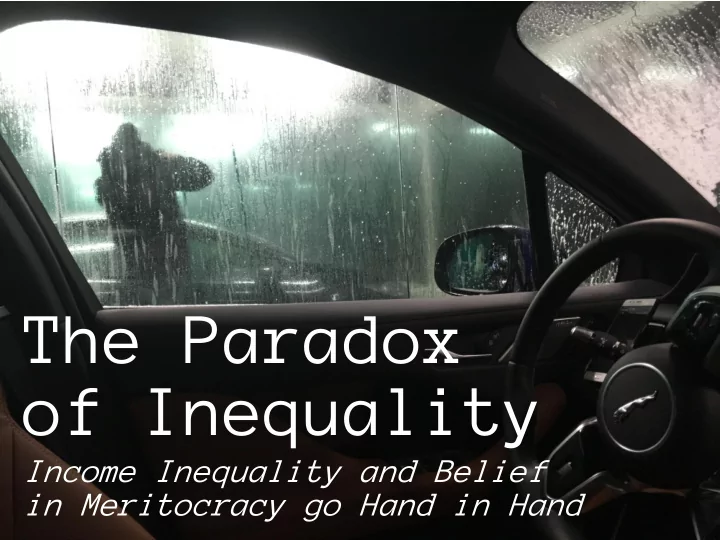

The Paradox of Inequality Income Inequality and Belief in Meritocracy go Hand in Hand
Introduction Across the Western world, income inequality is on the rise
Growing income inequality Across the Western world, income inequality is on the rise
Inequality is on the rise
Inequality is on the agenda…
… or is it?
Concerns about inequality
Concerns about inequality
Concerns about inequality
Concerns about inequality
Paradox of inequality Across the Western world, income inequality is on the rise Atkinson, Piketty, and Saez 2011; Keister and Moller 2000; McCall and Percheski 2010; Morris and Western 1999; Neckerman and Torche 2007; Piketty 2014; Saez and Zucman 2016 Yet, no evidence of growing concerns Alesina and Glaeser 2004; Brooks and Manza 2013; Kenworthy and McCall 2008; Kuziemko et al. 2015; Larsen 2016; Lübker 2007 In fact, citizens of more unequal societies are less concerned Anderson & Yaish 2012; Bucca 2016; Luttig 2013; McCall 2013; Paskov and Dewilde 2012
Paradox Despite the reality of rising inequalities, people in more unequal societies show less concern about it Solution Rising inequality and segregation mean that the rich and poor live increasingly insulated lives; unable to see the full extent of inequality and its structural roots
Overview 1. Discuss extant explanations 2. Present my own take 3. Test hypotheses using ISSP data 4. Conclusions for research, theory, policy
Extant explanations 1. People are misinformed about inequality ( cognition ) they underestimate extent of inequality, and are unware of rising inequalities Cruces, Perez-Truglia, and Tetaz 2013; Kenworthy and McCall 2008; Norton and Ariely 2011; Osberg and Smeeding 2006; Franko 2017; Kraus, Rucker, Richeson 2017; Choi 2019; Howarth et al. 2019
Misperceptions of inequality Source: Franko 2017 / US Census
Misperceptions of inequality Source: Franko 2017 / Harris Poll
Role of information Informational intervention may … … raise concerns and preference for redistribution … raise concerns but leave preferences unchanged … dampen concerns Alesina, Stantcheva and Teso 2017; Kuklinski et al. 2000; Cruces, Perez-Truglia, and Tetaz 2013; Trump 2017; Nair 2018; Kuziemko et al. 2015
Extant explanations 2. People do not care about inequality ( morality ) they believe economic inequality reflects a meritocratic process Bénabou and Tirole, 2006; Jost et al., 2004; Lerner, 1980; Kluegel and Smith, 1986; Lamont, 1992; Lamont et al., 2014; Hochschild, 1996; Kelly and Enns, 2010; Hall and Lamont, 2013; Mijs et al., 2016; Somers and Block, 2005
Synthesis Inequality transforms the social and spatial landscape; increasing the social distance between rich and poor
Synthesis Unequal societies are marked by greater social distance neighborhood segregation school segregation stratified and segmented labor markets network homophily and homogamy Mills 1959; Runciman, 1966; Lockwood, 1966; Irwin, 2018; Minkoff and Lyons, 2018; Dawtry et al., 2015; Kalleberg, 2009; Massey and Tannen, 2016; Musterd, 2005; Neckerman and Torche, 2007; Owens, 2016; Reardon and Bischoff, 2011; Tammaru et al., 2016; Mijs 2018
Hypotheses 1. Income inequality + belief meritocracy 2. Belief meritocracy - concerns about inequality
Data & methods International Social Survey Programme, 1987-2012 Hierarchical linear models 23 countries (level 3) 43 country-periods (level 2) 49,383 individuals (level 1) Income inequality (Gini) between-country and within-country over-time Schmidt-Catran and Fairbrother, 2016; Schmidt-Catran, 2016; Fairbrother 2014
Measures (individual) Concern “Income differences are too high” Meritocracy “who gets ahead in society” is decided by hard work Structural inequality “who gets ahead in society” is decided by coming from a wealthy family and/or knowing the right people
Measures (country-period) Income inequality post-tax household Gini (source: Milanovic) Economic development gross domestic product (source: OECD)
Trend in meritocracy belief
Trend in meritocracy belief
Trend in meritocracy belief
Trend in meritocracy belief
Trend in meritocracy belief
Inequality & popular opinion How do popular beliefs and concerns about inequality correlate with economic inequality?
Inequality & public concern concern Concern about inequality (r = -0.37)
Inequality & public concern concern Concern about inequality (r = 0.10)
Inequality & popular bel beliefs iefs Belief in meritocracy (r = 0.57) Belief in structural inequality (r = -0.30)
Individual beliefs How are individual citizens’ beliefs impacted by inequality? Pooling countries and time-periods, holding constant country-specific factors (politics, culture) general trends over time (neoliberalism) individual characteristics (education, employment)
Individual belie beliefs fs Belief in meritocracy Belief in structural inequality
Individual belie beliefs fs
Individual belie beliefs fs 100 Meritocracy Structural inequality 80 60 40 20 0 Lowest inequality Highest inequality
Individual belie beliefs fs 100 Meritocracy Structural inequality 80 60 40 20 0 Lowest inequality Highest inequality Belief in meritocracy +12 pts
Individual conce concern rns Belief in meritocracy Belief in structural inequality
Conclusions Research impact economic inequality on social distance Reardon and Bischoff, 2011; Watson, 2009; Reardon et al., 2018; Haller et al., 2016; Musterd, 2005 Theory inequality creates conditions for its own legitimation Kelly and Enns, 2010; Minkoff and Lyons, 2018
Theoretical implication Unequal societies create conditions for their legitimation Belief in Economic meritocracy inequality Social distance
Conclusions Politics publics caught in feedback loop breaking the loop requires less social distance more interactions heterogeneous institutions
Acknowledgements Josefina Cintron Tiryakian and Edward A. Tiryakian Fund Harvard Jason Beckfield, Larry Bobo, Devah Pager Columbia Liza Steele, Tom VanHeuvelen, ISA RC28 LSE Fabien Accominotti, Katharina Hecht, Dan McArthur, Sociology writing group
Recommend
More recommend